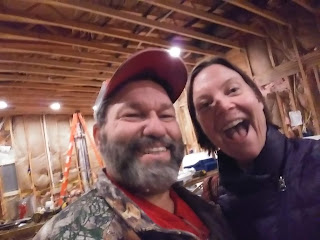the hurt
Pastor John Ortberg says, "God never wastes a hurt."
In other words, we can always learn from our pain, trials, mistakes, etc.
Today my hurt is in my knees, my back, my head... okay pretty much everywhere. (My brother and I did a test run of our next triathlon course over the weekend and I'm feeling the effects.)
Embracing the hurt doesn't mean ignoring the pain, or enjoying the pain. Embracing the hurt means asking why. Why have I been getting migraines? Why do I have tendinitis? Why does my lower back hurt?
Embracing the hurt also means asking if I need to make a change. Do I need to change my form when running, biking, or swimming? Do I need to make a change in my work environment (lighting, chair, desk, etc.)? Do I need to change my eating habits? Do I need to workout less, or workout more? Or do I simply need to go through the pain to get to where I want to be?
The same can be said for emotional pain. If I lose a loved one, for example, I'm obviously going to hurt. But asking why I hurt can help me explore what exactly I'm losing (a close relationship? a relationship I wish had been close?) and how best to process that loss (just giving it time, talking about it instead of denying it, making an effort to strengthen other relationships, etc.).
At church yesterday we also talked about how going through hard times in life allow us to encourage others when they go through hard times. "I understand what you are going through" is a very powerful statement, especially when that person truly understands because they too have been through divorce, death of a spouse, miscarriage, cancer, migraines, shin splints, etc.
It may not feel good at the time, but we can learn from anything and everything that life throws our way. If we are willing.
EMBRACE THE HURT.
Don't let it go to waste.
In other words, we can always learn from our pain, trials, mistakes, etc.
Today my hurt is in my knees, my back, my head... okay pretty much everywhere. (My brother and I did a test run of our next triathlon course over the weekend and I'm feeling the effects.)
Embracing the hurt doesn't mean ignoring the pain, or enjoying the pain. Embracing the hurt means asking why. Why have I been getting migraines? Why do I have tendinitis? Why does my lower back hurt?
Embracing the hurt also means asking if I need to make a change. Do I need to change my form when running, biking, or swimming? Do I need to make a change in my work environment (lighting, chair, desk, etc.)? Do I need to change my eating habits? Do I need to workout less, or workout more? Or do I simply need to go through the pain to get to where I want to be?
The same can be said for emotional pain. If I lose a loved one, for example, I'm obviously going to hurt. But asking why I hurt can help me explore what exactly I'm losing (a close relationship? a relationship I wish had been close?) and how best to process that loss (just giving it time, talking about it instead of denying it, making an effort to strengthen other relationships, etc.).
At church yesterday we also talked about how going through hard times in life allow us to encourage others when they go through hard times. "I understand what you are going through" is a very powerful statement, especially when that person truly understands because they too have been through divorce, death of a spouse, miscarriage, cancer, migraines, shin splints, etc.
It may not feel good at the time, but we can learn from anything and everything that life throws our way. If we are willing.
EMBRACE THE HURT.
Don't let it go to waste.



Comments
Post a Comment